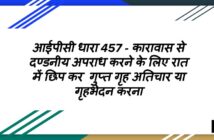Wrongful confinement can be done to restrain a person from proceeding somewhere or doing any act or pressuring the person to commit any act or offence, extort money or valuable security from the person confined or make the person confined to confess any information. But, do you know the meaning of wrongful confinement?
This article will discuss what wrongful confinement is, its essential ingredients, exceptions, whether it is bailable, and the punishment for different types of wrongful confinement. सदोष परिरोध in Hindi.
What is Wrongful Confinement?
Section 340 of the Indian Penal Code (IPC) states “Wrongful confinement” as restraining a person from moving beyond a specific circumscribing limit. In other words, when a person is retrained so that they cannot go beyond a particular limit, then such person is said to be wrongfully confined.
Example:
a) A causes B to get into a house and locks him from outside. Then, here B is said to be wrongfully confined by A.
b) A enters B’s house with a gun and locks the house inside, thereby preventing B from going outside. Here, B is said to be wrongfully confined.
Essential ingredients of wrongful confinement
To make a person guilty of wrongful confinement, there should be these essential ingredients:
- The person should be wrongfully confined to a place;
- The confinement should prevent that person from proceeding beyond a specific limit;
- There should be a wrongful intention to prevent a person from moving.
Exception
To constitute wrongful confinement, there should be an intention to restrain a person. Mere confinement does not amount to wrongful confinement. There can be a situation where a person is confined in good faith for the benefit of that person.
Example:
If a person is confined into a building due to some construction work, it does not amount to wrongful confinement.
What is the punishment for wrongful confinement?
Punishment for wrongful confinement depends on the gravity of the offence:
1. If a person wrongfully confines a person, then such person shall be liable under Section 342 of IPC for the imprisonment of either description (simple or rigorous) for a period of up to one year or with a fine which may extend to one thousand rupees or with both.
2. If a person wrongfully confines a person for three or more days, then such person shall be punished under Section 343 of IPC with imprisonment of either description for a period of up to two years or a fine or both.
3. If a person wrongfully confines a person for ten or more days, then such person shall be punished under Section 344 of IPC with imprisonment of either description for a period of up to three years or a fine or both.
4. Section 345 of IPC states that a person whose writ for liberation has been passed. If such a person is confined, then the person restraining will be punished with imprisonment of either description for two years and other punishments.
5. Section 346 of IPC states that wrongfully confining a person with the intention that the confinement of that person or place of confinement will not be known to anyone or any public servant. The person confining will be liable for imprisonment of either description for a period of up to two years or with a fine or with both in addition to other punishment.
6. Section 347 of IPC states that if a person wrongfully confines someone to extort money, valuable security or property from that person or from any person who is interested in the confined person or pressurizes the person confined or his relative to do any illegal act or give information to commit such illegal act will be liable for imprisonment for a period of up to three years or with fine or both.
7. Section 348 of IPC states that wrongfully confining a person for the purpose of extorting any information or confession to detect an offence or misconduct or to restore any property or valuable security or to satisfy any demand or claim shall be punished with imprisonment for three years or with fine or with both.
Is the punishment for wrongful confinement bailable?
Wrongful confinement is a cognizable and bailable offence that is compoundable by the person confined and triable by any Magistrate.
Conclusion
Wrongful confinement means restraining a person from proceeding beyond certain circumscribing limits. It is a cognizable and bailable offence that is compoundable at the instance of the person confined and triable by any Magistrate. The punishment for wrongful confinement is given under Section 342 -348 of IPC. Although the person’s intention is crucial to constitute an offence of wrongful confinement, any act done in good faith does not amount to wrongful confinement. You can read सदोष परिरोध in hindi.

